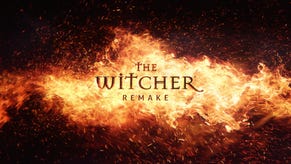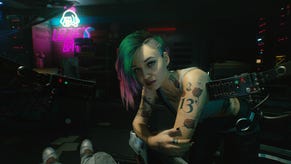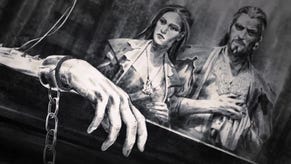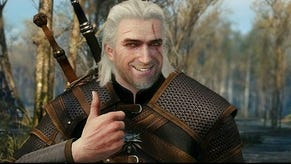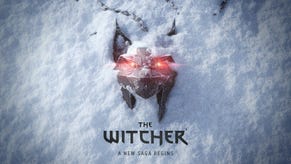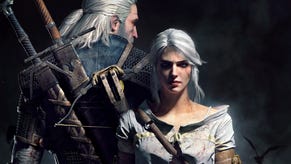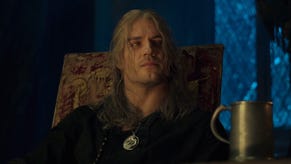The Witcher Done Good?
You probably spotted this from last week, but I wanted to reprise the story to lead into some other thoughts about The Witcher. Polish fantasy RPG The Witcher has sold 1 million copies. That's a fair amount for a game on any format. Developers CD Projekt are rightly pleased with this, and I'm glad that this unexpected success has allowed them scope to continue and expand their RPG-building projects. The Witcher was one of those games that made me say: "I'd like to see what they do next." I usually say that only to find that the company in question has gone bust (sorry, Troika) but it looks like that won't be the case here.
Wired reports: "The success of The Witcher has ensured that we'll be able to make the games we want," said CD Projekt CEO Adam Kicinski. "The amazing response we had from the gaming community to the Enhanced Edition really reinforced that we're on the right track with our development philosophy."
They've done extremely well, I'd agree, but let's not get too self-congratulatory about it all: The Witcher had some problems, as I found out over the past few weeks.
One thing that divides even RPS editors is how much voice acting matters in a game. Does it really make a difference to how we rate a game? Of course matters of combat mechanics and quest-structure are ultimately more important - but can such cosmetics be ignored in a game where talking is so central to the action? John and myself seem particularly riled by silly voices and mistaken enunciation. My first hours in Fallout 3 were uncomfortable thanks to cavalcade of "A TRAVELLER EH?" and other dialogue missteps, and I had to flee starting-town Megaton to be able to find myself hooked and interested in the game world. (Guess which route I took regarding that particular explosive device...)
The Witcher, of course, had no such open-world luxury. Despite the wide open sections each game presents to you, it is relatively linear, especially in the first five or so hours of play. Escaping the bad voice-acting there meant playing the Enhanced Edition and switching the language to its native Polish. I'm sure it sounded cheesy to a Polish speaker too, but it was a far less distressing experience than the English, which was fathoms below that proffered in daytime soap operas. If the Enhanced Edition accomplished anything, it was the ability to sidestep this clumsiness. It's hard to properly quantify the difference that this made, but treating the game as a foreign language property transformed it from something intolerable, to something compelling. Once this atmosphere-exploding chatter had been dealt with, the odd lines of broken text could safely be ignored, and I was able to plunge into the game proper.
Finally engaged with The Witcher's moody fantasy world, I was rapidly taken with it. The combat was just the right side of simplicity, and the way that quests unfolded seems to give genuine scope for decisions that belonged to me. That is good game design. There are stupid dead-ends - unexplained skill requirements for some quests, or entirely vague parameters for success in others - but they were generally passable.
Also good was the mood it struck throughout: constant undertones of desperation and nastiness. It's my general feeling that games aren't bleak enough - even when the subject of a game is hyper-death and battle-horror, the experience is still generally upbeat. (Valve talked, as you'll see in a forthcoming podcast, about how Left 4 Dead's characters had to be upbeat to avoid bumming out their players with the looming End Of World fiction it was creating.) So it was gratifying to see The Witcher be brave enough to just grind onward with grimness, and deliver a world in which traditional fantasy tropes marched alongside racism and other brutalities.
If there was one failure in this approach, it was that it made the dreary starting village area even more of a slog to get through. With one brain-lobe I'm loving the gritty game world, but in another I am getting bored and thinking "this should have lasted an hour at the most". The sense of release when the city and the swamps beyond finally opened the game up into something broad and explorable was astonishing. At fucking last! I'd been assured that if I just got to that point then the game would start to make sense, and that I'd start to understand the enthusiasm of its fans. And I did, and it does - but that fact alone causes some raised eyebrows about CD Projekt's "development philosophy". If that philosophy involves ignoring the fact that the starting hours of your game are completely rubbish - with NPCs that seem mentally ill thanks to nonsensical editing and a story teetering on a terrifying precipice of plot holes - then there's definitely some distance to go before "right track" status can be confirmed. This was a game that made be scream with frustration almost as often as it delighted me - the perpetual minefield of ambitious, problematic PC games. That it took so long to start motoring is a problem that couldn't be fixed by the EE patch, and seemed especially pressing to the time-starved gamer of 2008.
I say this with the knowledge that CD Projekt will be able to make another game, thanks to their initial success. It's a thumbs-aloft, gold-plated victory for the medium as we celebrate it. The Polish team now have a real chance to become a powerhouse in game development, bringing us a kind of RPG that is very rare indeed - something that encompasses inventory and stat fiddling, wide-open, consequence-filled story-telling, and actual graphical prowess. (Did everyone ignore that? The manifestation of a truly good-looking PC-only RPG?) Not only that, but it's a game that doesn't sit entirely within the exhausted archetypes of traditional fantasy games. There might be dwarves and elves in The Witcher's world, but at least their engagement, and the events surrounding them, are muddled up with the kind of ugliness and inhumanity that we find in our own history. For a game rooted in fantasy scribblings, it's taken an interesting path - picked on an author who didn't just regurgitate D&D's Tolkien-withering clichés, and seemingly tried to address the kinds of issues that games generally like to avoid: sex, racism, prejudice, and the trials of poverty. Yes, it's pulp fiction, but even pulp - when good - hits the right nerves.
It's tough to recommend The Witcher right now because there's just so much else out there. But it is one of those interesting singularities in the world of PC gaming. It's a gristly, meaty mess. Hard to digest but nonetheless nutritious. You'd be foolish to overlook it.
And if The Witcher's success allows CD Projekt to continue on their journey and confirms that they've taken the right path, I hope they'll also listen to criticism - of which there is plenty - and overcome the problems that face even the biggest RPGs in the business.


